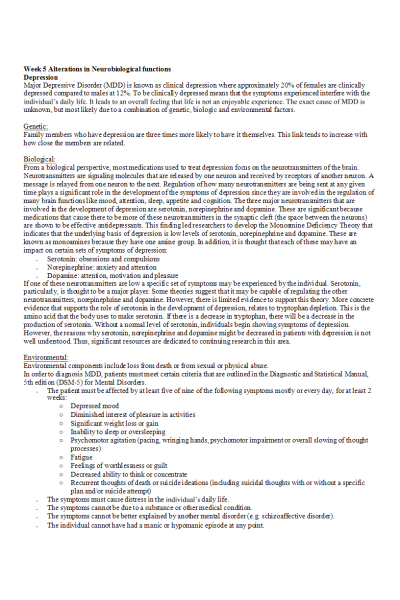NR 507 Week 5 Assignment; Alterations in Neurobiological Function (E-dapt Content)
-
$29.00
| Institution | NR 507 Advanced Pathophysiology |
| Contributor | Laura Palmer |
Week 5 Alterations in Neurobiological functions Depression
Major Depressive Disorder (MDD) is known as clinical depression where approximately 20% of females are clinically depressed compared to males at 12%. To be clinically depressed means that the symptoms experienced interfere with the individual’s daily life. It leads to an overall feeling that life is not an enjoyable experience. The exact cause of MDD is unknown, but most likely due to a combination of genetic, biologic and environmental factors.
Genetic:
Family members who have depression are three times more likely to have it themselves. This link tends to increase with how close the members are related.
Biological:
From a biological perspective, most medications used to treat depression focus on the neurotransmitters of the brain. Neurotransmitters are signaling molecules that are released by one neuron and received by receptors of another neuron. A message is relayed from one neuron to the next. Regulation of how many neurotransmitters are being sent at any given time plays a significant role in the development of the symptoms of depression since they are involved in the regulation of many brain functions like mood, attention, sleep, appetite and cognition. The three major neurotransmitters that are involved in the development of depression are serotonin, norepinephrine and dopamine. These are significant because medications that cause there to be more of these neurotransmitters in the synaptic cleft (the space between the neurons) are shown to be effective antidepressants. This finding led researchers to develop the Monoamine Deficiency Theory that indicates that the underlying basis of depression is low levels of serotonin, norepinephrine and dopamine. These are known as monoamines because they have one amine group. In addition, it is thought that each of these may have an impact on certain sets of symptoms of depression:
- Serotonin: obsessions and compulsions
- Norepinephrine: anxiety and attention
- Dopamine: attention, motivation and pleasure
If one of these neurotransmitters are low a specific set of symptoms may be experienced by the individual. Serotonin,
particularly, is thought to be a major player. Some theories suggest that it may be capable of regulating the other neurotransmitters, norepinephrine and dopamine. However, there is limited evidence to support this theory. More concrete evidence that supports the role of serotonin in the development of depression, relates to tryptophan depletion. This is the amino acid that the body uses to make serotonin. If there is a decrease in tryptophan, there will be a decrease in the production of serotonin. Without a normal level of serotonin, individuals begin showing symptoms of depression.
However, the reasons why serotonin, norepinephrine and dopamine might be decreased in patients with depression is not well understood. Thus, significant resources are dedicated to continuing research in this area.
Environmental:
Environmental components include loss from death or from sexual or physical abuse.
In order to diagnosis MDD, patients must meet certain criteria that are outlined in the Diagnostic and Statistical Manual, 5th edition (DSM-5) for Mental Disorders.
- The patient must be affected by at least five of nine of the following symptoms mostly or every day, for at least 2 weeks:
- Depressed mood
- Diminished interest of pleasure in activities
- Significant weight loss or gain
- Inability to sleep or oversleeping
- Psychomotor agitation (pacing, wringing hands, psychomotor impairment or overall slowing of thought processes)
- Fatigue
- Feelings of worthlessness or guilt
- Decreased ability to think or concentrate
- Recurrent thoughts of death or suicide ideations (including suicidal thoughts with or without a specific plan and/or suicide attempt)
- The symptoms must cause distress in the individual’s daily life.
- The symptoms cannot be due to a substance or other medical condition.
- The symptoms cannot be better explained by another mental disorder (e.g. schizoaffective disorder).
- The individual cannot have had a manic or hypomanic episode at any point................. Continue
| Instituition / Term | |
| Term | Year 2022 |
| Institution | NR 507 Advanced Pathophysiology |
| Contributor | Laura Palmer |





































